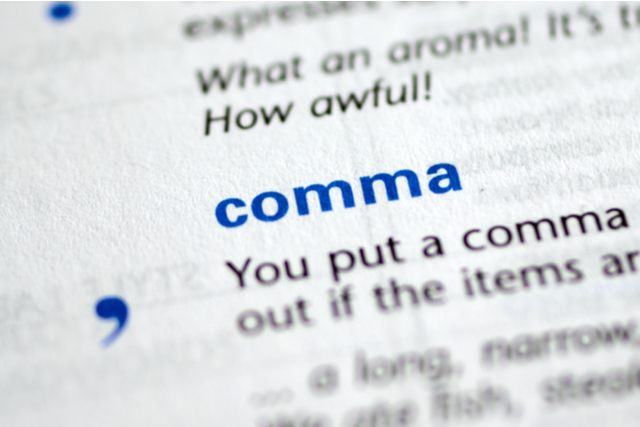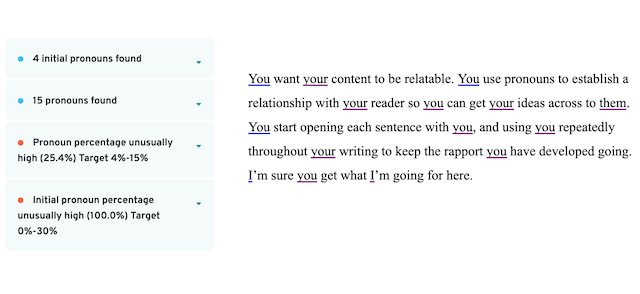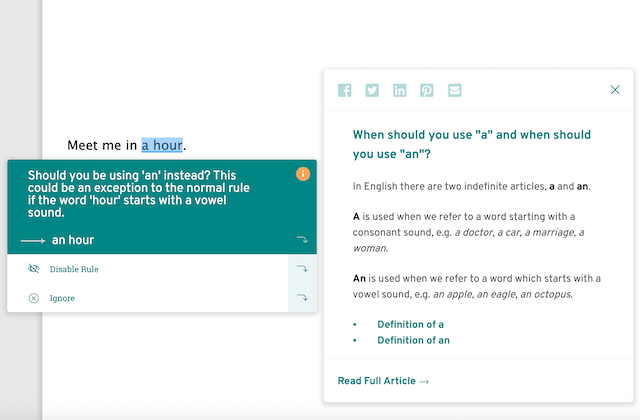
- School Teachers, Grammar Enthusiasts, and Real Life
- 1. Beginning Sentences with Conjunctions
- 2. “Like” and “Such As”
- 3. Dangling Modifiers
- 4. Ending Sentences with Prepositions
- 5. Split Infinitives
- 6. Contractions
- 7. Sentence Fragments
- 8. Personal Pronouns
- 9. Indefinite Articles (“A” and “An”)
- 10. Singular “They”
- Rules Are Meant to Be Broken... Sometimes
School Teachers, Grammar Enthusiasts, and Real Life
When I was a pre-adolescent, my Latin teacher made us memorize a phrase: Language is a given set of arbitrary vocal symbols by means of which a social group communicates. We went on to learn noun declensions and word placement within a sentence. And later, learned to construct ablative absolute phrases. We entered a world of strict grammar rules.
Grammar helps you communicate with clear syntax. It is guided by conventions, such as where punctuation goes and how it is used, and how prepositions reflect direction or where to place them in relation to a noun. For some, grammar goes beyond conventional usage to strict rules from which a writer may never deviate. These self-appointed grammar guardians feel the “rules” must never be broken.
The truth is that grammar rules are more flexible than that. When we write, we use language to communicate our thoughts, ideas, and stories. Fortunately, in the English language, the grammar rules are less strict than in Latin. We have verb tenses, but we don’t need to decline every noun in a sentence. We want our words to flow and we want our readers to understand our meaning.
Grammar rules are complicated and often confusing. It helps to refine details when you have a question by consulting a guide. You can choose between handy guides to large grammar tomes. ProWritingAid's Grammar Guide will give you all the information you need without headache-inducing explanations.
To help your writing flow, here are ten grammar rules you can bend.
1. Beginning Sentences with Conjunctions
Old grammar rules subscribed to the idea that each sentence was a complete thought. So, starting a sentence with the words and, because, but, or, so, also was unacceptable.
Wrong. These conjunctions help you break long unmanageable mega-sentences into distinct thoughts while indicating the flow from one sentence to the next.
2. “Like” and “Such As”
It used to be that the phrase such as was the standard to introduce examples.
Early writers in English, such as the anonymous poet of Sir Gawayn and the Grene Knight and Geoffrey Chaucer, sometimes bent the rules of grammar to fit their poetic style.
The word like was considered a preposition and not a conjunction. It was only used to signify resemblance.
I’ll find someone like you.
The word like has been freed from old restrictions, so now you can use it to introduce examples.
Early writers in English, like the anonymous poet of Sir Gawayn and the Grene Knight and Geoffrey Chaucer, sometimes bent the rules of grammar to fit their poetic style.
3. Dangling Modifiers
Dangling modifiers set off alarm bells for teachers and copy editors. The rule goes that the implied subject of the modifier (the one doing the action) must be identical to the subject of the main clause. The problem with dangling modifiers is that their subjects are inherently ambiguous.
Turning the corner, the view expanded into a cityscape.
In this sentence we don’t know who is turning the corner. Using a dangling modifier in this way should be avoided because it confuses the reader. However, there are right ways to use them, too. In current acceptance, if the reader or the writer is the implied subject, then the modifier can stand:
Turning the page, a new experience awaits.

Dangling modifiers should be avoided in formal writing, or if they might confuse the reader, but they can be used in fiction provided your meaning is clear.
4. Ending Sentences with Prepositions
We use prepositions all the time to express relationships:
- Against
- At
- Despite
- Concerning
- During
- From
- Including
- Into
- Of
- Throughout
- Towards
- Until
- Upon
- With
In formal writing, avoiding prepositions at the end of a sentence is a rule of thumb. But, in conversational writing you may sound stilted and cause your reader to disregard your statement because it sounds pompous.
Notice the difference in tone:
- From where did this cookie come?
- Where did this cookie come from?
It’s up to you how you want to connect with your reader. Break the rule if you need an informal tone.
5. Split Infinitives
In Latin, there’s no way to split an infinitive. The infinitive is one word: for example, to love is amare. But in English, a split infinitive means placing an adverb between the to and the main verb.
I want to permanently delete all the photos in my delete folder because they are taking up too much storage space.
The word permanently splits the infinitive verb form to delete, but it emphasizes the importance of the action.
Grammar gotchas say you should never do this. And, in formal writing, it’s best to avoid split infinitives. However, in articles and fiction writing, go ahead and emphasize the verb action with a modifier.
6. Contractions
A contraction is a shortened form of a word (or group of words) that omits certain letters or sounds. In most contractions, an apostrophe represents the missing letters. Your school teacher likely told you to avoid contractions when you were writing essays. And, that guideline still works for academic papers.

In conversational writing, however, contractions give the feel of natural language. The reader feels as though you are speaking to them without lecturing or being condescending. Fiction writers use contractions in dialogue so it sounds realistic.
7. Sentence Fragments
Like contractions, we use sentence fragments in everyday speech. A sentence fragment is a clause that is missing an element that makes it a complete sentence.
Like an adverb that emphasizes a verb in a split infinitive, a sentence fragment emphasizes an element of the preceding sentence. Use it to drive home a thought:
In times of a pandemic, use caution in public. Guard against contagion by following social distancing measures and by wearing a mask. Always a mask.
Avoid sentence fragments in academic writing. And, use them sparingly in conversational writing. But, it’s OK to use them to drive home your point.
8. Personal Pronouns
Personal pronouns stand in for people in a sentence. I, you, he, she, it, we, they, me, him, her, us, and them are all personal pronouns.
In school, you may have been taught to never use the pronoun “I.” But in conversational writing, I and we create a personal connection with your reader. The same goes for using you rather than one.
Notice how it feels to read each of these sentences:
- One should never use personal pronouns in writing.
- When you use personal pronouns, your reader will emotionally connect with your writing.
Use personal pronouns to form an immediate connection with your reader. That said, using too many can become distracting.

Luckily, there’s a quick way to check your pronoun usage. Use ProWritingAid’s Pronoun Report to check whether you’ve used too many pronouns at the beginning of sentences (initial pronouns) or to find out where you might have used a few too many overall.
9. Indefinite Articles (“A” and “An”)
Grammar rules say you should use an before a noun that starts with a vowel and a with a noun that starts with a consonant. But you can break this rule and follow the sound, not the spelling, of the word. Your intent is to make your sentence flow.
These sentences both correctly use an:
- Meet me in an hour.
- An ant climbed up my leg.
If you’re not sure which to use, ProWritingAid’s Realtime Checker can help.

Our AI-driven technology takes common usage and natural language into account, and will let you know if something’s not quite right.
Language, and the rules that uphold it, are supposed to work to help understanding and clarity. If putting “an” or “a” in front of another word is clunky when spoken aloud, then change it up.
10. Singular “They”
Language changes. In ancient Latin, the word carissime meaning “dearest one” was considered vulgar and a phrase used for women of the night but not in polite company. A hundred years later, everyone used it within polite society. Just so with the singular they.
Fifteen years ago, using they for a singular noun was considered a grammatical error. Now, it is accepted as a choice to avoid awkward phrasing for political correctness, like using their in place of his/her or his or her. Gone are the days of using the masculine pronoun to include everyone.
Your reader interprets your writing in their own way.
It’s OK and preferred to use singular they.
Rules Are Meant to Be Broken... Sometimes
Use language to connect with your reader. If your reader struggles with your grammar, they will resist reading your prose.
Stiff, overly formal writing distances your reader. Conversational writing aims to engage your reader at a personal level. You can help them understand your point with clear, concise writing. And you can use natural language to encourage engagement with your content.
When you “break” grammar “rules,” aim for a direct connection with your reader. Use sound judgment about what sounds right to communicate your idea.
If you have a question about the right construction, look it up. Use tools like ProWritingAid to help you isolate grammatical structure. Then use your ear to make a decision about breaking the rule.
Let natural language be your guide as you write to communicate your thoughts. You’ll make the right connection.


